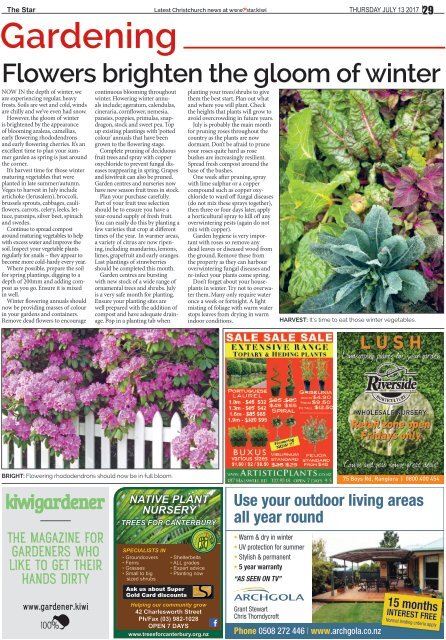The Star: July 13, 2017
Create successful ePaper yourself
Turn your PDF publications into a flip-book with our unique Google optimized e-Paper software.
<strong>The</strong> <strong>Star</strong> 29<br />
ardening<br />
Latest Christchurch news at www.<br />
Thursday <strong>July</strong> <strong>13</strong> <strong>2017</strong><br />
Flowers brighten the gloom of winter<br />
.kiwi<br />
NOW IN the depth of winter, we<br />
are experiencing regular, heavy<br />
frosts. Soils are wet and cold, winds<br />
are chilly and we’ve even had snow.<br />
However, the gloom of winter<br />
is brightened by the appearance<br />
of blooming azaleas, camellias,<br />
early flowering rhododendrons<br />
and early flowering cherries. It’s an<br />
excellent time to plan your summer<br />
garden as spring is just around<br />
the corner.<br />
It’s harvest time for those winter<br />
maturing vegetables that were<br />
planted in late summer/autumn.<br />
Veges to harvest in <strong>July</strong> include<br />
artichoke (Jerusalem), broccoli,<br />
brussels sprouts, cabbages, cauliflowers,<br />
carrots, celery, leeks, lettuce,<br />
parsnips, silver beet, spinach<br />
and swedes.<br />
Continue to spread compost<br />
around maturing vegetables to help<br />
with excess water and improve the<br />
soil. Inspect your vegetable plants<br />
regularly for snails – they appear to<br />
become more cold-hardy every year.<br />
Where possible, prepare the soil<br />
for spring plantings, digging to a<br />
depth of 200mm and adding compost<br />
as you go. Ensure it is mixed<br />
in well.<br />
Winter flowering annuals should<br />
now be providing masses of colour<br />
in your gardens and containers.<br />
Remove dead flowers to encourage<br />
continuous blooming throughout<br />
winter. Flowering winter annuals<br />
include; ageratum, calendulas,<br />
cineraria, cornflower, nemesia,<br />
pansies, poppies, primulas, snapdragon,<br />
stock and sweet pea. Top<br />
up existing plantings with ‘potted<br />
colour’ annuals that have been<br />
grown to the flowering stage.<br />
Complete pruning of deciduous<br />
fruit trees and spray with copper<br />
oxychloride to prevent fungal diseases<br />
reappearing in spring. Grapes<br />
and kiwifruit can also be pruned.<br />
Garden centres and nurseries now<br />
have new season fruit trees in stock.<br />
Plan your purchase carefully.<br />
Part of your fruit tree selection<br />
should be to ensure you have a<br />
year-round supply of fresh fruit.<br />
You can easily do this by planting a<br />
few varieties that crop at different<br />
times of the year. In warmer areas,<br />
a variety of citrus are now ripening,<br />
including mandarins, lemons,<br />
limes, grapefruit and early oranges.<br />
Last plantings of strawberries<br />
should be completed this month.<br />
Garden centres are bursting<br />
with new stock of a wide range of<br />
ornamental trees and shrubs. <strong>July</strong><br />
is a very safe month for planting.<br />
Ensure your planting sites are<br />
well prepared with the addition of<br />
compost and have adequate drainage.<br />
Pop in a planting tab when<br />
planting your trees/shrubs to give<br />
them the best start. Plan out what<br />
and where you will plant. Check<br />
the heights that plants will grow to<br />
avoid overcrowding in future years.<br />
<strong>July</strong> is probably the main month<br />
for pruning roses throughout the<br />
country as the plants are now<br />
dormant. Don’t be afraid to prune<br />
your roses quite hard as rose<br />
bushes are increasingly resilient.<br />
Spread fresh compost around the<br />
base of the bushes.<br />
One week after pruning, spray<br />
with lime sulphur or a copper<br />
compound such as copper oxychloride<br />
to ward off fungal diseases<br />
(do not mix these sprays together),<br />
then three or four days later, apply<br />
a horticultural spray to kill off any<br />
overwintering pests (again do not<br />
mix with copper).<br />
Garden hygiene is very important<br />
with roses so remove any<br />
dead leaves or diseased wood from<br />
the ground. Remove these from<br />
the property as they can harbour<br />
overwintering fungal diseases and<br />
re-infect your plants come spring.<br />
Don’t forget about your houseplants<br />
in winter. Try not to overwater<br />
them. Many only require water<br />
once a week or fortnight. A light<br />
misting of foliage with warm water<br />
stops leaves from drying in warm<br />
indoor conditions.<br />
HARVEST: It’s time to eat those winter vegetables.<br />
BRIGHT: Flowering rhododendrons should now be in full bloom.<br />
<strong>The</strong> magazine for<br />
gardeners who<br />
like To geT <strong>The</strong>ir<br />
hands dirTy<br />
www.gardener.kiwi<br />
100%<br />
naTiVe planT<br />
nursery<br />
Trees for CanTerbury<br />
speCialisTs in<br />
• Groundcovers<br />
• Ferns<br />
• Grasses<br />
• Small to big<br />
sized shrubs<br />
• Shelterbelts<br />
• ALL grades<br />
• Expert advice<br />
• Planting now<br />
Ask us about Super<br />
Gold Card discounts<br />
Helping our community grow<br />
42 Charlesworth Street<br />
Ph/Fax (03) 982-1028<br />
OPEN 7 DAYS<br />
www.treesforcanterbury.org.nz<br />
Use your outdoor living areas<br />
all year round<br />
• Warm & dry in winter<br />
• UV protection for summer<br />
• Stylish & permanent<br />
• 5 year warranty<br />
“AS SEEN ON TV”<br />
Grant Stewart<br />
Chris Thorndycroft<br />
Phone 0508 272 446 | www.archgola.co.nz<br />
15 months<br />
INTEREST FREE<br />
Normal lending criteria apply


















